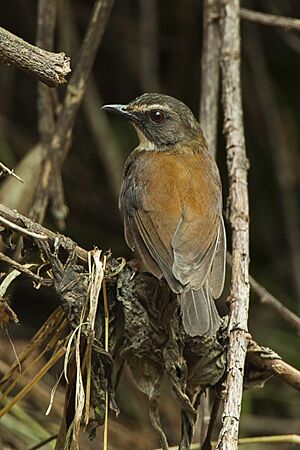Brown-chested alethe facts for kids
The brown-chested alethe (Chamaetylas poliocephala) is a fascinating bird that belongs to a group called "Old World flycatchers." These birds are known for catching insects in the air. You can find the brown-chested alethe in different parts of the African tropical rainforest. It doesn't live everywhere in the rainforest, but in separate areas.
This bird prefers to live in warm, wet forests. It likes both forests that are close to sea level and those found on mountains.
Quick facts for kids Brown-chested alethe |
|
|---|---|
 |
|
| C. p. carruthersi in Kakamega Forest | |
| Conservation status | |
| Scientific classification |
|
| Kingdom: | Animalia |
| Phylum: | Chordata |
| Class: | Aves |
| Order: | Passeriformes |
| Family: | Muscicapidae |
| Genus: | Chamaetylas |
| Species: |
C. poliocephala
|
| Binomial name | |
| Chamaetylas poliocephala (Bonaparte, 1850)
|
|
| Script error: The function "autoWithCaption" does not exist. | |
| Synonyms | |
|
|
Script error: No such module "Check for conflicting parameters".
About the Brown-Chested Alethe
The brown-chested alethe is a small to medium-sized bird. It gets its name from the brownish color on its chest. These birds are often shy and can be hard to spot in the dense forest. They spend a lot of time on the ground or in the lower parts of trees.
Where Does It Live?
This bird lives in the tropical forests of Africa. Its home stretches across several countries. You can find it in places like Sierra Leone, Ghana, Nigeria, and parts of the Democratic Republic of Congo. It also lives in Uganda, Kenya, Rwanda, and Burundi.
The brown-chested alethe prefers specific types of forests. It likes forests that are always warm and wet. These can be lowland forests or forests high up on mountains.
Naming the Bird
The brown-chested alethe was first officially described in 1850. A French scientist named Charles Lucien Bonaparte gave it its scientific name. He based his description on notes from another naturalist, Coenraad Jacob Temminck.
The scientific name for this bird is Chamaetylas poliocephala. The word poliocephala comes from ancient Greek words. Polios means "grey," and -kephalos means "-headed." So, its name basically means "grey-headed."
There are actually nine different types, or subspecies, of the brown-chested alethe. These subspecies look very similar but live in slightly different areas. They are all part of the same bird family.
 | May Edward Chinn |
 | Rebecca Cole |
 | Alexa Canady |
 | Dorothy Lavinia Brown |


